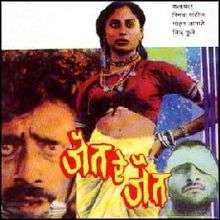Jait Re Jait
Jait Re Jait (English: Win, Win) is 1977 Indian Marathi language film directed by Dr. Jabbar Patel and produced by Usha Mangeshkar and Hridaynath Mangeshkar, under the banner of Mahalakshmi Chitra. The film stars Mohan Agashe and Smita Patil in the lead roles. The film won President's Silver Medal for Best Feature Film in Marathi at the National Film Awards.
| Jait Re Jait | |
|---|---|
 Poster | |
| Directed by | Jabbar Patel |
| Produced by | Usha Mangeshkar |
| Written by | Satish Alekar Anil Joglekar |
| Based on | Jait re Jait by G. N. Dandekar |
| Starring | Mohan Agashe Smita Patil Nilu Phule |
| Music by | Hridaynath Mangeshkar |
| Cinematography | Binod Pradhan |
| Distributed by | Mahalakshmi Chitra |
Release date |
|
| Country | India |
| Language | Marathi |
It is considered to be one of the greatest musical hits of all time in Marathi cinema. It is based on a book by G. N. Dandekar. Though the music achieved all-time hit status, the film was a box office disaster.
Plot
The story revolves around a tribal caste called the Thakar. Nagya (Mohan Agashe) is a drummer who has a passion for being a "pure one" (punyavant). He meets Chindhi (Smita Patil), who has abandoned her husband as she considers him useless. They both fall in love and strive hard to be united. Once when Nagya goes to jungle for wood-cutting, a queen honey bee attacks him and one of his eyes is injured. He decides to take revenge. The beehives are located high on a nearby difficult to climb peak {Lingoba}. He decides to cut all the beehives so that the queen-bee runs away. Meanwhile, Chindhi becomes pregnant with Nagya, but she still supports his dangerous attempt to climb the peak. Nagya then climbs the peak and cuts the hives. Chindhi is waiting at the base of the peak, but the disturbed honey-bees attack her and she dies in the incident. Nagya, in search of Queen honey-bee, loses his own queen[wife] in the end. This is a classic paradox, where he succeeds (Jait re jait, means WIN-WIN) in his revenge, but loses his wife.
The film highlights all the traditions of the Thakar tribe.
Cast
- Mohan Agashe as Nagya
- Late Smita Patil as Chindhi
- Late Nilu Phule as Nagya's father
- Late Sulabha Deshpande as Nagya's mother
- Narayan Pe
- Sushant Re
- Manjiri Paranjpae
- Meena Arjunwadkar
- Seema Dharmadhikari
- Shriram Ranade
- Chandrakant Kale
- Kamini
- Bal Karve
- Shriram Pendse
- Anant Kulkarni
- Dilip Mangalvedhekar
- Arvind Thakar
Crew
- Story - G. N. Dandekar
- Dialogues - Satish Alekar and Anil Joglekar
- Playback - Lata Mangeshkar, Asha Bhosle, Usha Mangeshkar, Varsha Bhosle, Ravindra Sathe and Chandrakant Kale
- Art - Desai
- Colour - Nivrutri Dalvi
- Make Up - Suresh Basale
- Stills - Rao and Rao
- Assistants:
Music - Amar Direction - Prasad Subhedar and Shrinivas Bhange Camera - Rajan Kothari and Rajesh Joshi
- Director of Photography - Binod Pradhan
- Director - Dr. Jabbar Patel
Music
The popular songs of the film are composed by Pt. Hridaynath Mangeshkar, with most of the lyrics by N. D. Mahanor and performed by Lata Mangeshkar, Asha Bhosle, Usha Mangeshkar, Ravindra Sathe and Chandrakant Kale. Poet Arati Prabhu contributed to the lyrics of the song "Me Raat Takli".
All lyrics are written by N. D. Mahanor; all music is composed by Pt. Hridaynath Mangeshkar.
| No. | Title | Singer(s) | Length |
|---|---|---|---|
| 1. | "Gorya Dehavarti" | Usha Mangeshkar, Ravindra Sathe | 03:58 |
| 2. | "Nabh Utaru Aala, Chimba Tharthar Valla" | Asha Bhosle | 05:32 |
| 3. | "Jambhul Piklya Zaadakhali" | Asha Bhosle, Ravindra Sathe | 04:03 |
| 4. | "Lingobacha Dongur" | Ravindra Sathe, Chandrakant Kale | 01:23 |
| 5. | "Wadi Varlya Waata" | 01:37 | |
| 6. | "Ha Doliya" | 02:45 | |
| 7. | "Mee Raat Taakli, Me Kaat Taakli" | Lata Mangeshkar, Ravindra Sathe, Chandrakant Kale | 04:30 |
| 8. | "Dongar Kathadi Thakarwadi" | Ravindra Sathe, Chandrakant Kale | 01:48 |
| 9. | "Kunya Raajan Raajan" | Smita Patil, Asha Bhosle | 02:32 |
| 10. | "Aamhi Thakar Thakar" | Ravindra Sathe, Chandrakant Kale | 04:19 |
| 11. | "Pik Karpal" | Ravindra Sathe | 04:01 |
| 12. | "Hee Dusryachi Baael" | 02:40 |
Awards
The songs from this film are popular in Maharashtra. The film earned actress Smita Patil and Jabbar Patel Filmfare Awards. Maharashtra State Film Awards for Best Direction was also presented to Patel. The 25th National Film Awards held in April 1978 honoured the film with President's Silver Medal for Best Feature Film in Marathi for;
"Consistently transferring to the film medium a successful fictional work (Jait re Jait by G. N. Dandekar); for high lightening the mutual inconsistencies of love, of the fear of God and of superstition in a simple, innocent community of tribal, for the memorable use of the drum in evoking presence of the God and expressing the inexorable demands of love for a cinematic form which captures the lyricism, the cadence and the lilt of folk culture."[1][2]
The shooting this film was done in locations of Maharashtra in Karnala, Khalapur, Kumbhavali and Thakarwadi in Raigad District. The titles appeared after 15 minutes after the start of the film and the song-mee raat taakli—appeared after 50 minutes after the start of the film.
References
- "25th National Film Awards". International Film Festival of India. Archived from the original on 10 October 2014. Retrieved 4 October 2011.
- "25th National Film Awards (PDF)" (PDF). Directorate of Film Festivals. Retrieved 4 October 2011.